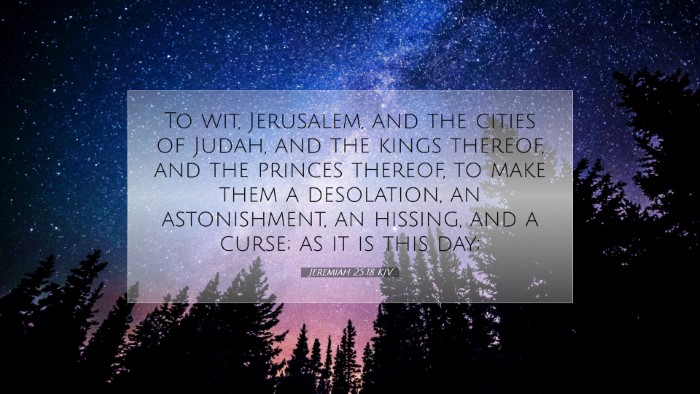Commentary on Jeremiah 25:18
Verse Context: Jeremiah 25:18 states, “To wit, Jerusalem, and the cities of Judah, and the kings thereof, and the princes thereof, to make them a desolation, and an hissing, and a curse; as it is this day.” This verse is part of a larger context in which the prophet Jeremiah conveys God's impending judgment on Judah and its leaders due to their unfaithfulness and idolatry.
Historical Background
The verse sits within a critical juncture in Israel's history. Jerusalem, the city known as the dwelling place of God, had become corrupt due to idolatry and disobedience to God's commandments. Jeremiah, often referred to as the weeping prophet, delivers messages of warning and impending punishment during a time when the Babylonian empire poses a significant threat to Judah.
Insights from Public Domain Commentaries
Matthew Henry
Matthew Henry emphasizes the severity of judgment expressed in this passage. He notes that “the desolation which is threatened is not merely physical; it is spiritual and communal.” Henry points out that Jerusalem's forsaking of the true God brought forth sorrow upon the entire nation. The cities of Judah are referenced to denote that while the focus is on Jerusalem, the surrounding regions also suffer from similar disobedience. Henry underscores the concept of a "curse," which indicates a divine withdrawal of favor and protection, resulting in social and civic chaos.
Albert Barnes
Albert Barnes offers an analysis of the terms used in this verse, particularly focusing on "desolation" and "hissing." He interprets “desolation” as a complete waste where the once vibrant life of Jerusalem is reduced to emptiness. The term “hissing” denotes a state of reproach and mockery from surrounding nations – a poetic way of highlighting the dishonor and disgrace that will come upon Jerusalem as a result of divine judgment. Barnes also links the impending calamity to God's ultimate plan for restoration, noting that while punishment is severe, it serves the greater purpose of leading the people back to repentance and reconciliation with God.
Adam Clarke
Adam Clarke elaborates on the prophetic nature of Jeremiah’s words. He describes how the prophecy serves as both a warning and a lamentation. Clarke draws attention to the importance of the “kings and princes” mentioned in this verse, emphasizing their accountability for leading the people astray. He notes that their leadership had profound consequences on the spiritual state of the nation. Clarke suggests that the prophetic message highlights a universal truth of governance: when leaders turn away from God, the consequences affect the entire populace. Clarke also astutely points out that the prophet not only announces judgment but also embeds a call to seek divine mercy.
Theological Implications
This verse invites profound reflections on the themes of judgment, accountability, and hope. It reminds pastors and theologians of the gravity of spiritual leadership and the societal ripple effects of moral failure. It challenges contemporary believers to examine their own commitments to God and the cultural practices that may lead to spiritual decay.
Judgment and Accountability
Divine Judgment: The prophetic pronouncement serves as a solemn reminder that divine judgment is not arbitrary; it is a direct response to unfaithfulness. God, in his justice, allows nations and cities to experience the consequences of their actions. It urges leaders and followers alike to acknowledge that their spiritual health is intimately linked.
Hope for Restoration
While the emphasis is on judgment in this verse, both Henry and Clarke imply that such judgments also carry the hope of restoration. Engaging with the foresight of future redemption invites contemplative responses from believers. It connects to the larger narrative of the Bible that, despite judgment, God continually seeks to draw His people back through grace and mercy.
Practical Applications
The message in Jeremiah 25:18 extends beyond ancient Israel and calls for relevant action today:
- Self-Examination: This text encourages both individuals and communities to look within. Are there aspects of spiritual life being neglected that could lead to desolation?
- Leadership Responsibility: Those in positions of influence must reflect on their actions and teachings. How are they guiding their congregations in faithfulness to God?
- Understanding Judgement: Recognizing that God’s judgment can be corrective in nature prompts a deeper appreciation for His justice and mercy.
- Seeking Restoration: This verse should prompt earnest prayers for revival and reconciliation among communities that struggle with spiritual desolation.
Conclusion
Jeremiah 25:18 carries weighty implications regarding leadership, accountability, and the nature of divine judgment. As believers engage with this text, they are reminded that God's actions, though punitive, often serve to lead His people toward renewal and greater faithfulness. For pastors, students, and scholars, it invites an opportunity for dialogue about how ancient prophecies resonate in contemporary faith communities. In recognizing the call to repentance and humility, this passage stands as both an admonition and hope for spiritual revitalization.


